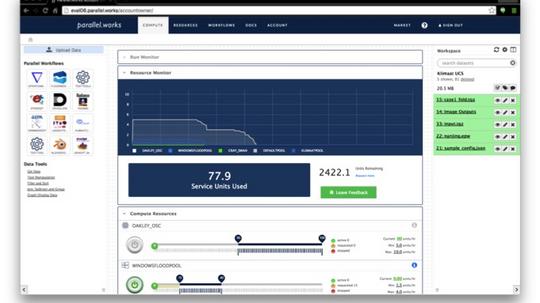
Supercomputing has changed the way we process big data in a wide range of industries.
Unsurprisingly, these capabilities to perform multiple complex tasks in the least possible amount of time have traditionally come at a price -- in fact, even the first one hundred supercomputers were sold at a price of $8 million each (hefty, especially by the standards of early 1960s standards when they first launched). While this price point has mostly restricted supercomputing to academia, federal research labs and large industry, Parallel Works, a startup incubated at the University of Chicago’s Polsky Exchange, is out to democratize this -- by bringing the underlying technology to the cloud.
Parallel Works’ platform takes supercomputing to the software-as-a-service, pay-per-use model, thus removing talent and resource maintenance costs typically associated with big machines. The software is domain agnostic--employed in applications as diverse as climate change research to neuroscience to mass media analysis--and the technology's custom interface can be packaged, stored, and deployed as per the needs of the client or industry. Previously, with resource constraints, industry experts would have to conduct a time-consuming process of creating custom workflows that could handle large-scale parallel computing. Parallel Works hopes to make that process simpler, with a browser-based online platform and a cloud-based workflow -- similar to using an app store.
Matthew Shaxted, one of the co-founders, was working as a computational designer at leading architecture firm Skidmore, Owings & Merrill (SOM) where he first noticed opportunities in applying high performance computing to his work.
One day, he happened to hear about parallel computing -- several processors or CPUs running concurrently to solve large-scale computing problems -- from Michael Wilde, research scientist at Argonne National Labs and the University of Chicago’s Computational Institute. Wilde is the primary investigator behind the open source programming language Swift (not to be confused here with Apple’s iOS development platform), which is easy, fast, flexible and allows users -- even those without training in parallel programming -- to run multiple programs concurrently as soon as their inputs are available. Shaxted and Wilde made Swift the basis of a year-long collaboration, working on applications in the built environment space, such as minimizing solar radiation or energy consumption. They officially launched Parallel Works in 2015, also bringing on Wilde’s daughter Michela, who had just finished business school at Northwestern’s Kellogg School of Management.
“Cloud computing, advances in software technology (like open source simulation tools), and new programming models now allow for advanced computational methods by companies that never had access to such techniques in the past,” said Michael, in an interview with Chicago Inno. “We are already seeing big computing as the next wave after big data.” For example, global construction and environmental engineering company CH2M uses Parallel Works to more efficiently undertake flood risk modeling. Other clients, in spaces like financial engineering and sustainability design, have used Parallel Works to better quantify return on investment or quickly visualize climate patterns, respectively.
The National Science Foundation itself sees several applications of parallel computing, from medical imaging, manufacturing, risk insurance, to understanding the global power grid and modeling food supply.
“We are already seeing big computing as the next wave after big data.”
At the Polsky Exchange, the startup first received $120,000 in funding from the University of Chicago Innovation Fund in January 2015, and also participated in the CIE/CISCO Innovation Challenge and I-Corps program, which helped them define their target market and business model. They launched the beta version of their software about a year ago, around the same time when they were also awarded a phase one SBIR (Small Business Innovation Research) grant of $150,000 from the Energy Department. Now based at 1871, they are actively fundraising as well as hiring in engineering and sales.








